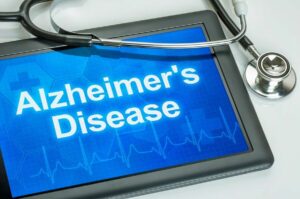Alzheimer’s Disease: The Importance of Early Diagnosis and Treatment
Alzheimer’s disease affects many people over 65, and science is making breakthroughs on a regular basis. Medical experts agree that early diagnosis of Alzheimer’s disease is critical to getting the best care for the patient.
Early signs of Alzheimer’s
The early warning signs of Alzheimer’s are:

- Misplacing things like keys, phones, glasses, or hearing aids, and being unable to find them.
- Confusion and memory loss concerning important dates and facts.
- Loss of problem solving ability, which may manifest as difficulty paying bills or following a recipe.
- Unable to identify the calendar date.
- Bad decisions, which are uncharacteristic of the patient.
- Changes in personality, mood, or temper.
- Social withdrawal.
- Worsened vision and depth perception.
- Patient doesn’t know where she is.
Diagnosis
It is not only important to get an early diagnosis, but also an accurate one. Especially in its early stage, Alzheimer’s can look the same as a brain tumor, brain injury, stroke, or another type of dementia. Many other causes of memory loss are treatable, making an accurate diagnosis critical to good patient outcomes.
While Alzheimer’s disease is primarily diagnosed through questionnaires, blood work, and spinal tap, a brain scan is necessary for a definite diagnosis. Your senior’s doctor should perform an MRI to rule out other possible causes of memory loss. A CT scan may also be needed.
The value of early diagnosis: medications
While there is no cure for Alzheimer’s, there are drugs that have been successful in slowing the progress of the disease, giving patients better quality of life for longer. Rivastigmine and Galantamine are prescribed for patients in the early to mid stages of Alzheimer’s. Both drugs are cholinesterase inhibitors, and they prevent the breakdown of a brain chemical that is vital to good reasoning, memory, and mental sharpness.
It is important for families to understand that the use of these medications will require some trial and error. Cholinesterase inhibitors sometimes cause nausea, diarrhea, and vomiting. So if your loved one cannot tolerate one medication, it will be time to try another.
The value of early diagnosis: Caregivers get time to transition
When Alzheimer’s is diagnosed early and accurately, caregivers have time to prepare for the changes. Many families will make the choice to employ home care for a few hours a week in the early stages. Patients in the advanced stages of Alzheimer’s often need 24-hour in-home care.
If a parent or grandparent is in the early stages of Alzheimer’s, he or she can fully express his preferences. That means that you will have the peace of knowing what your beloved elder wanted, whether that is full-time professional in-home care, the care of a sibling, or some other arrangement.
Patients need time to make decisions
An Alzheimer’s diagnosis will come as a shock to most people, but getting the news early allows the patient to make needed arrangements. This may involve selling the family home, moving in with relatives, hiring in-home care, and choosing an end-of-life living facility.
An early diagnosis also gives patients time to make financial arrangements that will protect their estates. It is wise to designate a financial power of attorney and a health care power of attorney in the early stages of the disease.
Finally, Alzheimer’s does not have to be a disaster. Early diagnosis, careful planning that includes the patient in decision making, and early treatment with medications can prolong a patient’s quality of life and lessen the family’s emotional loss.
Sources:
- https://www.mayoclinic.org/diseases-conditions/alzheimers-disease/diagnosis-treatment/drc-20350453
- https://www.mayoclinic.org/diseases-conditions/alzheimers-disease/in-depth/alzheimers/art-20048103
- https://www.columbianeurology.org/neurology/staywell/early-onset-alzheimers-disease
- https://www.ncbi.nlm.nih.gov/pmc/articles/PMC6935598/
If you or an aging loved-one are considering In-Home Care Services in the Belton MO area, please contact the caring staff at Elder Care of Kansas City, today. Proudly serving Jackson, Clay, Platte and Cass Counties in Missouri as well as Johnson and Wyandotte Counties in Kansas for over 30 years. Call us at 816-333-3322.
- Sitting Outside With Your Loved One - April 15, 2024
- Ways Alzheimer’s Care Supports Seniors With This Disease - April 3, 2024
- Tips for Making Senior Home Care Successful - March 18, 2024
